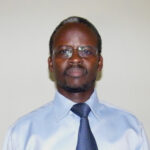Sylvie Matelly kicked off the discussion by pointing out
the need to double-check all information, adding that
the responsibility should be greater for journalists who
are information disseminators. She traced fake news to
a pre-social media era. “Many years ago, even before
social media, people were convinced that the earth was
flat and that kings were divine. That was a form of fake
news.”
Fake news has made work difficult for mainstream
media, according to Dickens Okello. “This fake news
phenomenon has affected our work because we must
break news instantly and yet in doing so, one can easily
become a victim.” He castigated practices by some
media houses who write obituaries of incumbent leaders
before they die, saying the practice is inhumane and
dangerous. “If fake news were to trickle on social media
about the death of such a leader, it’s easy for a media
house to fall prey by publishing the obituary.”
As the fake news phenomenon gets widespread,
questions remain as to whether universities and
journalism schools are adjusting their curriculum
to reflect the challenge.
Dr. William Tayebwa argued that the tenets of journalism
– such as truth, balance, being ethical and humane – have
not changed. “We are retooling [journalism students]
but the cardinal principles upon which journalism works
shouldn’t fail.” He defined fake news in three ways:
• Disinformation (blatant falsehoods)
• Misinformation (partial presentation of facts)
• Malinformation (presentation of information in bad
taste to highlight a particular narrative)
Vincent N’gethe elaborated that fake news campaigners
now target big media houses to sow seeds of doubt and
damage their credibility. To maintain trust and counter
fake news, N’gethe recommended the following:
• Journalists should tell their audiences how they
acquired their content.
• Investment should be made in extra fact-checking
systems.
• Information should be verified regardless of the
platform.
• It is not enough to get information from a reputable
source, organisation or entity. Fake news does not
spare them either.
The panellists also weighed in on the political
dimension to fake news and how leaders use
the cover of fake news to discredit media
organisations.
Dr. Tayebwa noted that fake news has also become a
political construct. “Anything that’s presented, if it’s an
inconvenient truth, becomes fake news.”
Christoph Plate agreed, noting that some politicians are
scared of social media. He emphasised that responsibility
should be central to social media use and, for journalists,
confirming information first before breaking it. “It’s good
to have a strong backbone and say, we need to verify.”
N’gethe said journalists should be alert to governments
that want their own version of truth. “Most governments
want to use their own definitions of fake news. We have
to make sure we are not being manipulated.”
Matelly concurred, stating that leaders understand the
power of social media, and have managed to convince
the minority that real news is fake news.
Kampala Geopolitics Conference




